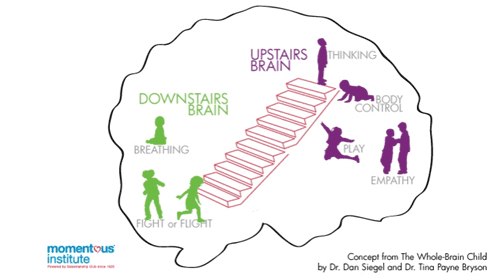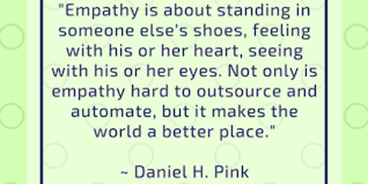Understanding Your Child's Point of View
(The Most Valuable Parenting Skill)
Article by Perth Psychologist, Darcy Hill
One of the most common reasons that parents of young children come to see me is due to what they describe as "meltdowns". Those moments when a child becomes so overwhelmed by their emotions that they seem to.. 'lose it'. This might involve screaming, crying, throwing things, hitting, kicking and any number of undesirable behaviours. Often parents will say things like "he knows that hitting isn't ok" or she "just won't listen when I tell her to stop" and these experiences leave them feeling frustrated and/or helpless with how to help the little people in their life.
First we need to understand a bit about the brain. If we think of our brain in a simple way as having two parts, upstairs and downstairs - see this helpful picture below that I have borrowed from the amazing book "The Whole-Brain Child" which I highly recommend.

The way I find useful to talk about these two areas is that the upstairs brain is where the thinking happens and where logic, reasoning and negotiation skills can be accessed. The downstairs brain can be thought of as the emotion centre. When a child is having a meltdown the emotion centre is firing at full force and using all the brains resources, limiting the capacity of other areas of the brain to help out. What this means is that the upstairs brain is really not available in that moment so logic, reasoning and thinking things through are hard to come by. This is why your child is hitting even though they "know" it is wrong or why your logical explanation of why they can't have another ice-cream doesn't seem to have any impact or may even make things worse! Many common and popular parenting strategies are based on the upstairs brain being available where we can then use problem solving and reasoning skills. However, when a meltdown hits, this just doesn't seem to do the job... why you might ask? Applying a behavioural solution to an emotional problem leaves children with a mismatch and can leave them feeling alone with their emotions (and this just gives them more reason to feel upset).
A way I find helpful to think about this (and is often a big part of the work I do with parents) is to focus on helping the child's emotional brain calm down. Sounds simple right? But of course, when your child is having a meltdown what happens to your grown up emotional brain? Often it starts firing off too and this can get in the way of our ability to think clearly. So step one - make sure we are calm enough to deal with this issue, whether it's taking a quick moment for a centring breath or some words of self-encouragement, it is important for us to be in a space where we can help contain our child's emotions. Many parents have told me that remembering children aren't born knowing how to manage emotions and that they have to learn this skill (as they will learn to read, ride a bike etc) can help take some of the pressure of.
So how do we help our children deal with these big feelings that are overwhelming them? The greatest and most powerful thing you can offer as a parent is empathy. What this looks like in the real world, is understanding your child's point of view and meeting them where they are at. Importantly, this definitely DOES NOT mean giving in and giving them what they want. It is about understanding what they are feeling and why they are feeling it.

This is a great quote which really highlights what children need from us in that moment. Us to stop, put their shoes on for a moment and understand them. So instead of seeing our son hitting his sister as a 'naughty' behaviour we have to punish and respond to, we can see his perspective. Perhaps, his sister took away his toy and he was overwhelmed by the emotion of this and does not yet have the skills to negotiate with her to get it back. In the first instance we might be likely to focus on the rules of "no hitting", perhaps send the boy to his room or 'tell him off'. With these responses does he feel like we understand, like we can help him with his problem? My guess is that none of us feel very able to turn to the person yelling at or scolding us to ask for help. However, these moments, can be connecting and learning moments. Showing him that we understand his experience "you're feeling upset that your sister took your toy" is the first step in calming his emotional brain down. When we are able to help children by giving language to their experience the intensity of the emotion seems to reduce then we also start to get back some of those helpful brain functions like thinking and problem solving. Our child also now knows that we understand their problem and are showing some availability to help. The possibilities now are much greater to help and support our child to learn some of those negotiation skills that they are still acquiring. Because, at the end of the day, the way children learn to manage their emotions is with our help and with practice, practice and more practice.
Advice: This is a very simple explanation of how empathy can help our children in developing emotion regulation and of course in reality it is often much more complicated. My hope is that this article may give parents the thought to view situations through their children's eyes and that it may provide some benefit. However, a child can present with more severe emotion regulation difficulties, anxiety and other mental health concerns. If the level of distress caused by your child's difficulties or the level of impairment to their functioning is significant, assessment is recommended by a qualified Clinical Psychologist who can help in understanding your child and developing an individualised treatment plan to manage these concerns.
If you would like to learn more about Understanding Your Child's Point of View or if you would like to make an appointment, Darcy can be contacted by phone or email.
Contact Details
Email: [email protected]
